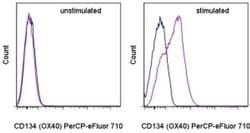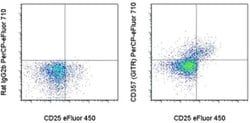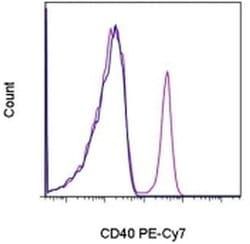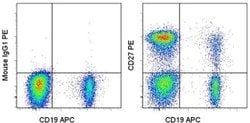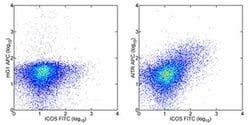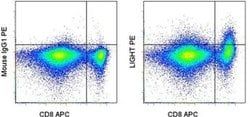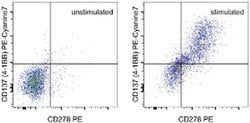CD30 Monoclonal Antibody (mCD30.1), PE, eBioscience™, Invitrogen™
Manufacturer: Invitrogen
Select a Size
| Pack Size | SKU | Availability | Price |
|---|---|---|---|
| Each of 1 | 50-103-15-Each-of-1 | In Stock | ₹ 22,606.00 |
50-103-15 - Each of 1
In Stock
Quantity
1
Base Price: ₹ 22,606.00
GST (18%): ₹ 4,069.08
Total Price: ₹ 26,675.08
Antigen
CD30
Classification
Monoclonal
Concentration
0.2 mg/mL
Formulation
PBS with 0.09% sodium azide; pH 7.2
Gene Accession No.
Q60846
Gene Symbols
TNFRSF8
Purification Method
Affinity chromatography
Regulatory Status
RUO
Gene ID (Entrez)
21941
Content And Storage
4° C, store in dark, DO NOT FREEZE!
Form
Liquid
Applications
Flow Cytometry
Clone
mCD30.1
Conjugate
PE
Gene
TNFRSF8
Gene Alias
Ber-H2; Cd30; CD30 antigen; CD30 molecule; CD30L receptor; cytokine receptor CD30; D1S166E; Ki; Ki-1; Ki-1 antigen; Lymphocyte activation antigen CD30; sCD30; soluble CD30; TNF receptor superfamily member 8; TNFRSF8; Tumor necrosis factor receptor superfamily member 8; tumor necrosis factor receptor superfamily, member 8; Tumor necrosis factor superfamily member 8; tumor necrosis factor superfamily, member CD30
Host Species
Armenian Hamster
Quantity
100 μg
Primary or Secondary
Primary
Target Species
Mouse
Product Type
Antibody
Isotype
IgG
Description
- Description: The mCD30.1 monoclonal antibody reacts with mouse CD30, a 105-120 kDa member of the TNFR superfamily
- CD30 is not detectable on splenocytes, but can be upregulated on T cells stimulated in vitro through TCR with a peak expression around day 4-5 post-activation
- CD30 is expressed by both CD8^+ and CD4^+ activated cells
- It is suggested that CD30 regulates cytokine secretion by T cells and has a role in T cell development
- Applications Reported: The mCD30.1 antibody has been reported for use in flow cytometric analysis
- Applications Tested: The mCD30.1 antibody has been tested by flow cytometric analysis of resting and activated mouse splenocytes
- This can be used at less than or equal to 1 μg per test
- A test is defined as the amount (μg) of antibody that will stain a cell sample in a final volume of 100 μL
- Cell number should be determined empirically but can range from 10^5 to 10^8 cells/test
- It is recommended that the antibody be carefully titrated for optimal performance in the assay of interest
- Excitation: 488-561 nm; Emission: 578 nm; Laser: Blue Laser, Green Laser, Yellow-Green Laser
- Filtration: 0.2 μm post-manufacturing filtered
- CD30 (Ki-1, TNF Receptor Superfamily Member 8) is a type I transmembrane glycoprotein of the TNF receptor superfamily
- CD30 was originally identified as a cell surface antigen of Hodgkins and Reed-Sternberg cells using monoclonal antibody Ki-1
- The ligand for CD30 is CD30L (CD153)
- The binding of CD30 to CD30L mediates pleiotropic effects including cell proliferation, activation, differentiation, and apoptotic cell death
- CD30 has a critical role in the pathophysiology of Hodgkin's disease and other CD30+ lymphomas
- CD30 acts as a costimulatory molecule in thymic negative selection
- In addition to its expression on Hodgkin's and Reed-Sternberg cells, CD30 is also found in some non-Hodgkin's lymphomas (including Burkitt's lymphomas), virus-infected T and B cells, and on normal T and B cells after activation
- In T cells, CD30 expression is present on a subset of T cells that produce Th2-type cytokines and on CD4+/CD8+ thymocytes that co-express CD45RO and the IL4 receptor
- Soluble form of CD30 (sCD30) serves as a marker reflecting Th2 immune response
- TRAF2 and TRAF5 can interact with this receptor, and mediate the signal transduction that leads to the activation of NF-kappaB
- CD30 is a positive regulator of apoptosis, and has been shown to limit the proliferative potential of autoreactive CD8 effector T cells and protect the body against autoimmunity
- Two alternatively spliced transcript variants of this gene encoding distinct isoforms have been reported
- CD30 is expressed by mononuclear cells in Hodgkin's lymphoma, Reed Sternberg cells and most Anaplastic Large Cell Lymphomas (ALCL)
- CD30 is also expressed by embryonal carcinomas.
